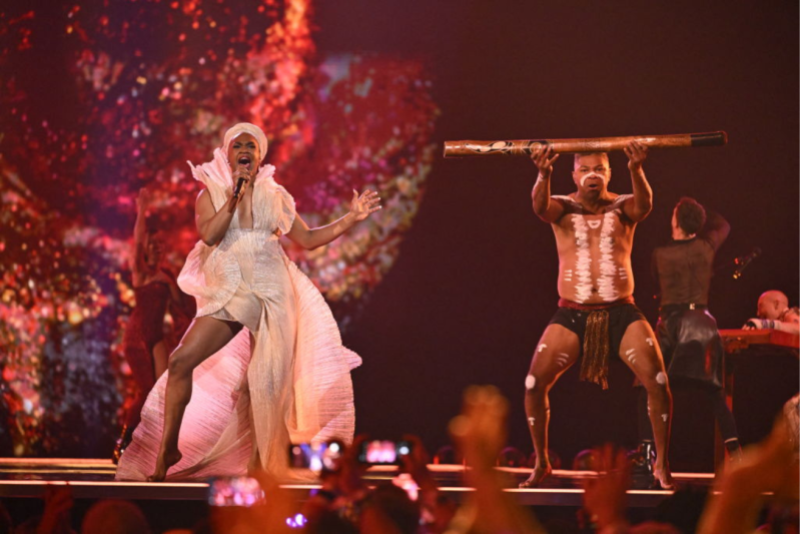Eurovision 2024: Australia’s Electric Fields knocked out in the semi-final

Source: Eurovision
Australia has been knocked out of Eurovision 2024, failing to make it past the semi-final stage.
Australia’s entry this year, electronic music duo Electric Fields who performed the song One Milkali (One Blood), won’t be part of the song contest’s grand final.
Performing early on Wednesday morning, the inspirational dancefloor anthem partly sung in the Indigenous Yankunytjatjara language earned Australia a bottom-five finish.
Of the 15 acts in the semi-final, Iceland, Poland, Moldova and Azerbaijan also failed to qualify for the grand final.
It is Australia’s worst result in Eurovision since Montaigne failed to make the final in 2021.
Australia at Eurovision:
- 2015: Guy Sebastian, Tonight Again: #5=
- 2016: Dami Im, Sound of Silence: #2
- 2017: Isaiah, Don’t Come Easy: #9
- 2018: Jessica Mauboy, We Got Love: #20
- 2019: Kate Miller-Heidke, Zero Gravity: #9
- 2020: Montaigne, Don’t Break Me: Contest cancelled due to Covid
- 2021: Montaigne, Technicolour: Failed to qualify
- 2022: Sheldon Riley, Not The Same: #15
- 2023: Voyager, Promise: #9
- 2024 Electric Fields, One Milkali (One Blood): Failed to qualify.
Singer Zaachariaha Fielding and keyboard player/producer Michael Ross have been performing as Electric Fields since 2015.
“We can breathe, we’re still buzzing from the three minutes,” Fielding said after the semi-final, according to SBS.

Electric Fields perform at the 2024 Eurovision song contest in Sweden. Photo: Getty
“We did a killer performance. We felt like rock stars. That audience was just absolutely giving.
“It’s going to be a memory that will be embedded with us for the rest of our lives.”
Meanwhile, Croatia and Ukraine, two favourites to win Eurovision 2024, were among the first 10 contestants to qualify for the grand final, following an initial round of semi-finals in Malmo Arena.
Fans in quirky and glittery outfits waved flags from the participating countries inside the arena, with many dressed up as their favourite contestant or in their national colours.
Croatia’s Baby Lasagna (real name Marko Purisic) and Ukrainian duo, alyona alyona and Jerry Heil, are both among bookmakers’ top five together with Italy, Netherlands and Switzerland to win the music kitsch-fest.
Streaming data from Spotify also suggests a strong chance for host nation Sweden.
“For Ukraine this is a big platform … I think this is the place where you can state your mind freely, openly and for the world to listen,” Ukrainian fan Victoria said, as she arrived ahead of the show.
Ukraine’s folk-inflected pop song Teresa & Maria, which has a strong dance beat and fast-paced rap, is about union, kindness and love, as well as the resilience and strength of women, according to its performers.
Eurovision fans Ross Stewart and Ivo Vasilev from Britain arrived ahead of the show dressed as Croatia’s Baby Lasagna.
“We tried to recreate it with what we could buy off Amazon. So we decided, because he’s performing tonight, to dress up as him,” Stewart said.
The artist’s entry Rim Tim Tagi Dim is about a young Croatian who leaves his home aspiring to become a “city boy” with better opportunities.
Security was high around Malmo arena, but police said the evening went as planned.
Cyprus, Finland, Ireland, Lithuania, Luxembourg, Portugal, Serbia and Slovenia also advanced to Saturday’s grand final.
Former Eurovision contestant Eric Saade made a guest performance with a black-and-white keffiyeh scarf wrapped around his wrist.
Eurovision bills itself as a non-political event and organisers have resisted calls to boycott Israel from this year’s competition, sparking protest from artists and ministers.
Much focus is expected to be on Israel’s Eden Golan and her song Hurricane in the second semi-final on Thursday, with bookmakers placing her among the top 10 to win the competition.








